Cascades Climate Challenge: A Recipe for Love
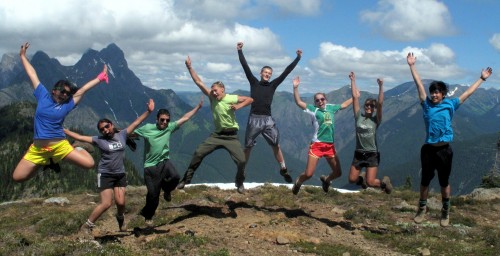 What do you get when you mix 38 high-school students in two 20-day programs in a wildly beautiful place with early morning wake-up calls surrounded by snowcapped peaks, days of paddling over glassy water, and hiking on lush mountain trails? Answer: one life-changing summer. North Cascades Institute just wrapped up its fourth successful year of Cascades Climate Challenge. Young high-school leaders from across Washington and Oregon spent three weeks exploring the public lands of the North Cascades. The students studied the effects of climate change and what they and their communities can do to help, learned about the climate science behind those changes, experienced the natural history that makes the North Cascades such a unique place, learned the important role of public lands while practicing stewardship on them, and grew personally as leaders and public speakers.
What do you get when you mix 38 high-school students in two 20-day programs in a wildly beautiful place with early morning wake-up calls surrounded by snowcapped peaks, days of paddling over glassy water, and hiking on lush mountain trails? Answer: one life-changing summer. North Cascades Institute just wrapped up its fourth successful year of Cascades Climate Challenge. Young high-school leaders from across Washington and Oregon spent three weeks exploring the public lands of the North Cascades. The students studied the effects of climate change and what they and their communities can do to help, learned about the climate science behind those changes, experienced the natural history that makes the North Cascades such a unique place, learned the important role of public lands while practicing stewardship on them, and grew personally as leaders and public speakers.
As students reminisced about their life-changing summer over hugs and tearful goodbyes during the closing ceremony on the final day, lead instructor Justin McWethy touched on what makes this experience so special: love. Beyond the curriculum, the countless hours spent making this program such a success, and the weeks spent exploring and learning about the North Cascades ecosystem, we hope students leave with a deep love for themselves, for their communities, and for this planet. Students leave with new eyes, new knowledge, and a better understanding of how important love and compassion is to this world and the powerful position they are in to effect change. In Cascades Climate Challenge students realize they must be the change they want to see in the world.
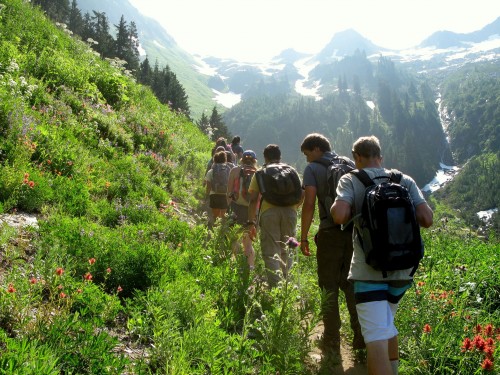 Session 2 students hike through wildflowers along Hidden Lake Trail.
Session 2 students hike through wildflowers along Hidden Lake Trail.
Love for each other
For many of the students, Cascades Climate Challenge brings many first experiences: longest time away from home, first time backpacking, paddling a canoe, and camping with a group of strangers in the wilderness. At first these experiences are intimidating and the initial couple days of their 11-day backcountry experience are spent getting accustomed to life in the wilderness. However, the students inevitably form a strong community as they listen to each other’s life stories, and begin developing lasting friendships as they work a cohesive and unified team. During this backcountry time students learn climate science, invaluable leadership and public speaking skills, how to give and receive feedback, and how to powerfully share their personal stories. As the days go on, students begin to take accountability for the group, or better yet, the team. They push each other to give 100% to the experience. Students actively reflect on Margaret Mead’s famous statement: “Never doubt that a small group of thoughtful, committed citizens can change the world. Indeed, it is the only thing that ever has,” and how it relates to their group. Supported by a dynamic team of instructors, they experience firsthand how important a thoughtful and committed group is to a community, and to realizing change in those places.
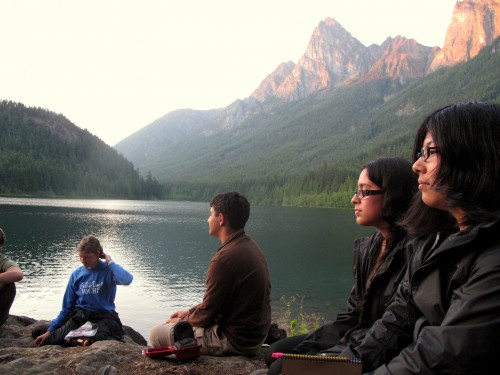 CCC4 students sit together on the shores of Hozomeen Lake.
CCC4 students sit together on the shores of Hozomeen Lake.
Love for their communities
Although this program whisks students away to the stunning North Cascades National Park (NOCA) and Mount Baker-Snoqualmie National Forest, their home communities are not forgotten. The hard work students contribute throughout their 20 days is in preparation for their return home. Cascades Climate Challenge is not intended to be an isolated experience in a student’s life, but rather a door to leadership in their home communities and future opportunities in other public lands. During their 20-day experience the students travel to Mt. Baker’s Easton Glacier to learn firsthand how important glaciers are to this planet, visit organic and local Blue Heron Farm to learn about sustainable food systems, and hike through delicate subalpine ecosystems to learn how climate change is affecting these places. Through these unique experiences, students craft their own climate stories to share at the student-led Campfire Ranger Program at Colonial Creek Campground on their final night. The students, many of whom were shy and nervous public speakers on the first day, stood up in front of an audience comprised of the general public, National Park, and Institute staff to share their experiences and what they have learned through participating in this program. They spoke eloquently about the impact this program has had on their lives and how they are going to bring this impact back to their home communities. One student shared how this program had impacted him personally:
“I hope that you know what this program has done and also what it will and can do. I hope you know it has clearly opened my eyes and opened my mind. I have developed skills I never had before: public speaking, leadership, stewardship, and a certain care for this earth. I have new knowledge about my effect, your effect, and every human on the earth’s effect on the planet we need and have learned to love. I have the deepest thanks to you for changing me drastically enough to say changing my life.”
– 2012 Cascades Climate Challenge student
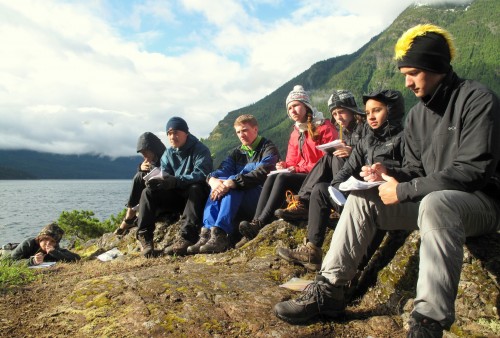 CCC1 students sit for a lesson on Ross Lake.
CCC1 students sit for a lesson on Ross Lake.
Their powerful messages brought tears to many listeners’ eyes. The Campfire Ranger Presentation marked the beginning of many presentations to come. When the students return home they will complete a culminating service project in their home communities. Here, a powerful transition occurs as the students become the teachers. Not only do this year’s 38 students reach another 1,000 people, they also create service projects unique to their interests and inspirations. Some of these young leaders will teach other students what they have learned firsthand during the summer, while others will choose to lead environmental projects in their high schools. Get ready communities–because these young leaders are coming to you!
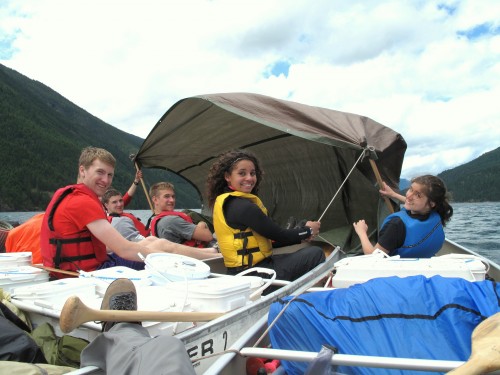 CCC1 students revel as they sail their canoes up Ross Lake.
CCC1 students revel as they sail their canoes up Ross Lake.
Love for this planet
Prior to the start of this program, the concept of stewardship for many solely meant volunteering. However, students develop a whole new meaning for the word stewardship by practicing stewardship of the everyday. During their 20-days spent exploring the wild places of NOCA, students daily practiced Leave No Trace principles, working hard to minimize their impact while leaving campsites in better condition than they found them. They also took care of each other’s well-being. As one student from CCC4 exclaimed: “Like the alpine trees growing in groups to withstand the weight of the winter snow, I wouldn’t have survived if it wasn’t for the support from the group.”
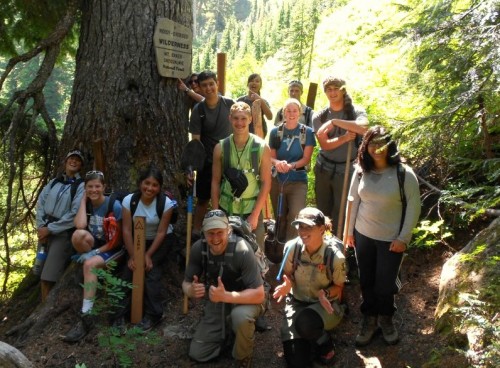 Members of CCC Session 2 smile after a successful day of stewardship work in the Mt. Baker-Snoqualmie National Forest.
Members of CCC Session 2 smile after a successful day of stewardship work in the Mt. Baker-Snoqualmie National Forest.
The summer would not be complete without a visit from NPS employee Mike Brondi, Volunteer and Youth Coordinator for NOCA. For many of the students, Mike is the epitome of stewardship. Mike led the students in a day of stewardship, pulling invasive reed canary grass and collecting native plant seeds along Ross Lake. As the students worked, Mike taught them about the importance of native grasses to the Ross Lake ecosystem, the role climate change plays in relation to invasive species, and how the non-native red-sided shiner fish are impacting the lake. The students squealed while the prolific red-sided shiners gently nibbled their ankles as they did service work. These personal experiences with the many forms that stewardship takes will travel back with the students to their home communities.
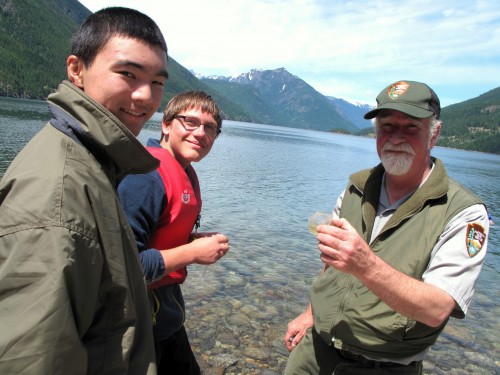 NPS employee Mike Brondi with CCC2 students on Ross Lake.
NPS employee Mike Brondi with CCC2 students on Ross Lake.
The close of this summer’s program was both the end to a fantastic experience and the beginning for these young leaders in creating positive change. Like ripples in a pond, the impact of these young climate change ambassadors will spread across their home communities. Thank you to all of the dedicated staff and volunteers that worked so hard to make this year’s Cascades Climate Challenge such a success. Lastly, to the 38 extraordinary students who gave 100% of themselves to this program – thank you! See you soon at the Henry M. Jackson Youth Leadership Conference, November 10-12, 2012.
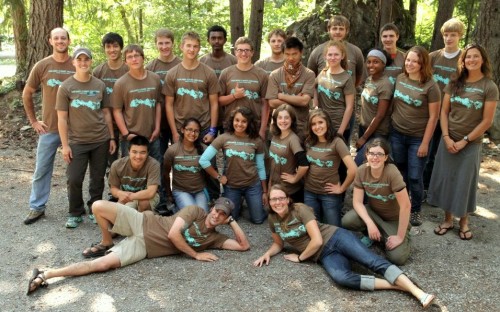 CCC Session 2 students and instructors on their final day of the program!
CCC Session 2 students and instructors on their final day of the program!
Leading photo of CCC3 students triumphantly jumping after summiting Desolation Peak. All photos courtesy of CCC 2012 staff, instructors, and students.


What an inspiring and refreshing glimpse into NCI’s life changing programs. A personal and well written piece. So great to again see the deep forests and lakes of the Northwest…..after being in Arizona for the past 15 years.
What a great experience for the youth of today who will be the stewards of the land in the future. What they learned on this adventure will go a long ways in determining whether we can sustain and save the planet, hopefully what they learned will be passed on to generations to come. My generation and generations before were not concerned with what the Earth offered, just what we could take from the Earth to profit big business and ourselves. My Grandson was fortunate enough to participate in this program, I think it is an Avatarian experience for all who were there.